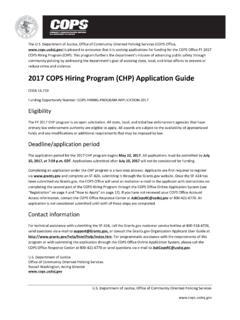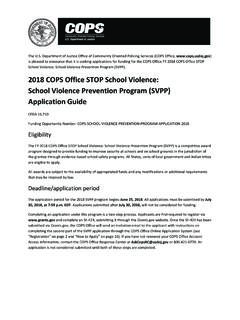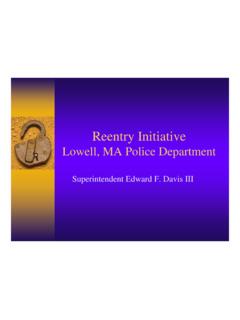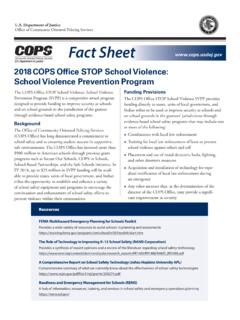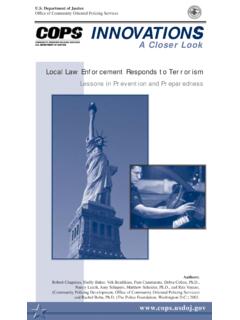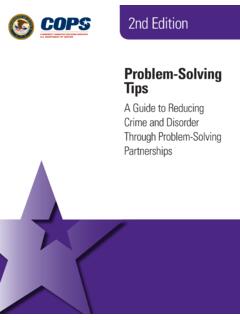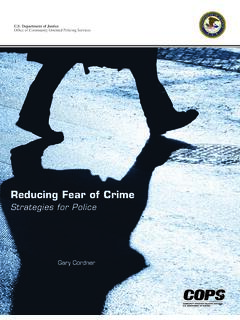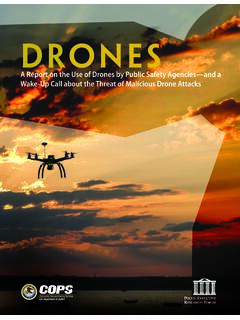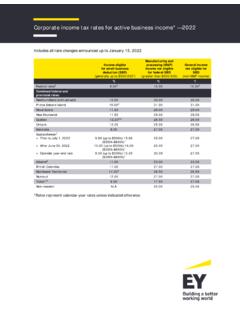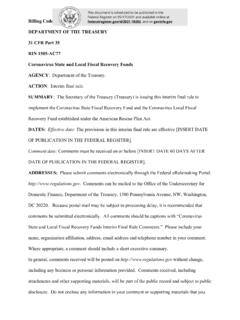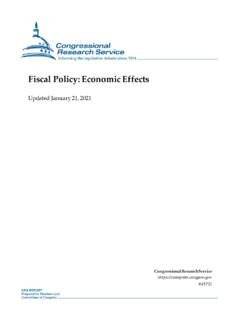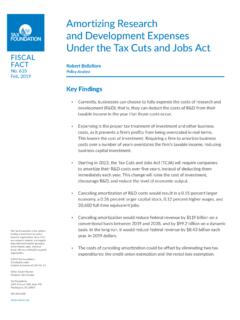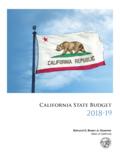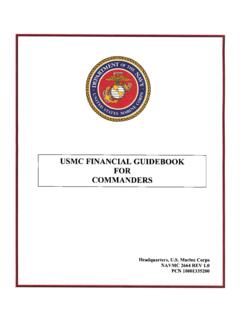Transcription of The Relationship Between Economic Conditions, Policing ...
1 The Relationship Between Economic Conditions, Policing , and Crime Trends An Addendum to The impact of the Economic Downturn on American Police Agencies Matthew C. Scheider , Deborah L. Spence, and Jessica Mansourian ii The Relationship Between Economic Conditions, Policing , and Crime Trends Dear Colleagues, As law enforcement agencies throughout the nation continue to face challenges brought about by the current Economic climate, the importance of community Policing cannot be overstated. The core mission of the United States Department of Justice (USDOJ) is the protection of the American people, and the law enforcement community plays a central role in the advancement of this mission. As a component of the Justice Department, the COPS Office is committed to acting as the voice for state and local law enforcement agencies within the federal government. For nearly two years we have been tracking the changes that have been occurring in law enforcement agencies across the country and believe that the recent Economic downturn will continue to have a serious impact on the way American police agencies operate for the foreseeable future.
2 The COPS Office is determined to help build the framework necessary to enable our law enforcement partners to make the most of these limited resources and to continue to develop and promote promising and effective public safety practices. In advancing these goals, the COPS Office recently awarded more than $100 million in new grants that supported the hiring and retention of approximately 800 officers in agencies across the country. This year s funding continued our emphasis on helping law enforcement agen-cies address specific community public safety problems. In addition, we provided nearly $12 million in Community Policing Development grants to identify and advance best practices throughout the nation. This report is part of our ongoing commitment to assisting local law enforcement agen-cies thrive in the current economy. It builds on the report we released last year, The impact of the Economic Downturn on American Police Agencies, which was the first federal analysis that examined the impact the economy has had on the law enforcement community.
3 In the following pages you will find an overview of what we know about the interactions of crime rates, the economy, and police staffing and practices. By bringing together years of research on these complicated issues into a single, concise report, we hope that it will help you in understanding that the Relationship Between the economy and crime is not as straightforward as we may sometimes wish, but that quality polic-ing grounded in the community Policing philosophy can reduce crime and improve the health and safety of our communities. As always, we at the COPS Office are grateful for the opportunity to be of service to American law enforcement. Sincerely, Bernard K. Melekian, Director Office of Community Oriented Policing Services Contents iii Contents Letter from the Director ..ii About the COPS Office ..iv Introduction.. 1 The Relationship Between Economic Conditions and Crime Is Complex.. 2 The Relationship Between Police and Crime Is Also Complex .. 8 Policing Quality Is What Will Mitigate the Effects of This New Economy.
4 12 Conclusion.. 15 References .. 16 iv The Relationship Between Economic Conditions, Policing , and Crime Trends About the COPS Offce The Office of Community Oriented Policing Services (COPS Office) is the component of the Department of Justice responsible for advanc-ing the practice of community Policing by the nation s state, local, terri-tory, and tribal law enforcement agencies through information and grant resources. Community Policing is a philosophy that promotes organizational strate-gies that support the systematic use of partnerships and problem-solving techniques, to proactively address the immediate conditions that give rise to public safety issues such as crime, social disorder, and fear of crime.
5 Rather than simply responding to crimes once they have been commit-ted, community Policing concentrates on preventing crime and eliminat-ing the atmosphere of fear it creates. Earning the trust of the community and making those individuals stakeholders in their own safety enables law enforcement to better understand and address both the needs of the community and the factors that contribute to crime. The COPS Office awards grants to state, local, territory, and tribal law enforcement agencies to hire and train community Policing profession-als, acquire and deploy cutting-edge crime fighting technologies, and develop and test innovative Policing strategies. COPS Office funding also provides training and technical assistance to community members and local government leaders and all levels of law enforcement. The COPS Office has produced and compiled a broad range of information resourc-es that can help law enforcement better address specific crime and op-erational issues, and help community leaders better understand how to work cooperatively with their law enforcement agency to reduce crime.
6 Since 1994, the COPS Office has invested nearly $14 billion to add community Policing officers to the nation s streets, enhance crime fighting technology, support crime prevention initiatives, and provide training and technical assistance to help advance community Policing . By the end of FY2011, the COPS Office has funded approximately 123,000 additional officers to more than 13,000 of the nation s 18,000 law enforcement agencies across the country in small and large jurisdictions alike. Nearly 600,000 law enforcement personnel, community members, and government leaders have been trained through COPS Office-funded training organizations. As of 2011, the COPS Office has distributed more than million topic-specific publications, training curricula, white papers, and resource CDs. COPS Office resources, covering a wide breadth of community Policing topics from school and campus safety to gang violence are available, at no cost, through its online Resource Information Center at This easy-to-navigate website is also the grant application portal, providing access to online application forms.
7 1 Introduction Introduction The recent Economic downturn has been devastating to local economies and, by extension, their local law enforcement agencies. According to a report by the National Institute of Justice, the United States is currently experiencing its 10th Economic decline since World War II (Wiseman 2011).
8 Curtailing revenues nationwide have forced local governments to make cuts in spending across the board, which includes spending on public safety. Over the last few years, many agencies have experienced considerable effects from budget constrictions including mandatory furloughs and hiring freezes resulting in significant reductions in staffing levels never experienced before. In every corner of the United States, state, local, and tribal police departments are being forced to lay off sworn and civilian staff members, which results in modified opera-tions. At some point, it is likely that these troubling trends will begin to impact public safety if they haven t already. In October 2011, the Office of Community Oriented Policing Services (COPS Office) compiled a report on how the current Economic con-ditions are affecting police agencies nationwide. The report, entitled The impact of the Economic Downturn on American Police Agencies, examined a variety of surveys, publications, and data sets to analyze the effect the current fiscal conditions within law enforcement agencies are having on staffing, delivery of services, and organizational management.
9 As a component of the Justice Department, the COPS Office is com-mitted to act as the voice for state and local law enforcement agencies within the federal government. As police department s nationwide face reductions to their operating budgets many agencies have had to re-duce or discontinue training programs, eliminate plans to acquire new technologies, and in the worst cases, make severe cuts to personnel. Consequently, one of the biggest issues identified by law enforcement agencies in relation to the Economic downturn is the need to prove their worth to local policy makers in order to justify budget alloca-tions and staffing levels. All too often, the value of a law enforcement agency is measured by the number of arrests that are made, or through fluctuations in the crime rate. However, the value of law enforcement goes much deeper than crime reduction alone. Local law enforcement agencies are frequently the most public face of government to citizens; a perceived one-stop shop for handling any type of complaint, whether criminal or not.
10 Therefore, the value and legitimacy of a department is determined by the totality of its community interactions, not just the crimes it solves. The importance of this cannot be overlooked in efforts to prove the worth of a department in lean Economic times, even though it is much more difficult to measure in a quantifiable way. There are a number of reasons why it is difficult to reliably demonstrate a causal Relationship Between the economy and crime, the number of police and crime, or the effects of police budgets on crime, all of which will be discussed in this report. What is important to understand is that the value of police cannot simply be measured through crime rates alone. When arguing the value of police officers, the public, media, When arguing the value of police officers, the public, media, and policy makers too often judge police success solely on crime numbers, thereby ignoring other value that Policing provides to neighborhoods. 2 The Relationship Between Economic Conditions, Policing , and Crime Trends and policy makers too often judge police success solely on crime num-bers, thereby ignoring other value that Policing provides to neighbor-hoods and local communities.
